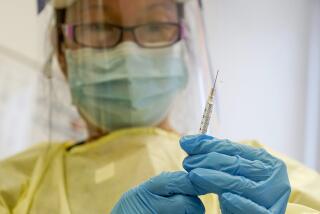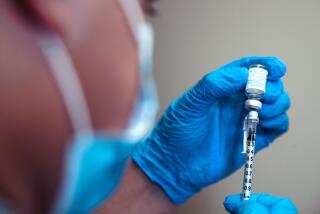Lawmakers Voice Doubts on Smallpox Vaccination Plan
WASHINGTON â With front-line health workers already lining up for inoculation, the first congressional hearing on the Bush administrationâs smallpox vaccination policy revealed Wednesday that some lawmakers have serious reservations about the program.
âWe need some clearheaded thinking on this,â said Sen. Tom Harkin of Iowa, the ranking Democrat on a Senate Appropriations subcommittee.
âAre we going in a direction thatâs going to siphon off a lot of money for one threat instead of building a system capable of responding to multiple bioterror threats?â
Yes, responded Patrick M. Libbey, executive director of the National Assn. of County and City Health Officials.
âThere is much more to [the smallpox program] than lining people up in a mall to get their flu shots,â he said.
Libbey estimated the total costs to local health agencies, including the salaries of those administering the vaccine and the costs of setting up vaccination clinics, at $142 to $220 per person vaccinated. Some counties, he said, were being forced to cut back on childhood immunizations, tuberculosis screening and other health programs.
Iowa health officials said their total costs were $400 per person.
Wednesdayâs hearing, which marked the first time Congress has publicly engaged the huge vaccination program that President Bush announced Dec. 13, highlighted the unusual lack of congressional oversight.
But because the new program will ultimately be carried out in most congressional districts, lawmakers are connected to it more directly than they are to other federal policies they debate and vote on.
The first phase of the program, a plan to vaccinate up to 450,000 health-care workers who would be the first to treat any smallpox cases, got off to a shaky start last Friday. On Wednesday, Los Angeles County began its vaccination of up to 9,200 health-care workers.
Phase 2 of the program calls for the vaccination of as many as 10 million police, fire and emergency personnel.
Despite months of careful planning by federal health agencies, states and local authorities are finding that the program presents numerous challenges.
Doctors and nurses have to be educated and trained, clinics have to be organized, and health-care workers have to take time off from their regular jobs to administer the vaccine.
On top of that, at least 80 hospitals nationwide have decided not to participate, and untold numbers of health-care workers are declining to volunteer for the vaccine because they are concerned about its risks and, in most cases, have no guarantee they will be compensated if they are injured or have to take time off work to recover from the vaccineâs side effects.
Several labor unions and public health organizations and some members of Congress have called on the administration to delay implementation until some of the compensation issues can be resolved.
On Wednesday, the National Governorsâ Assn. added its voice to those calling for more time and money.
âSmallpox preparedness, as important as it may be, cannot be accomplished at the expense of transferring dollars away from other public health bioterrorism preparedness activities or any other existing public health program,â the governorsâ group said in a statement.
Yet 58% of county and city health officials who responded to a survey by Libbeyâs group reported being forced to make such shifts.
All the senators attending Wednesdayâs hearing reported that public health officials, hospital administrators and citizens have expressed concerns about the program.
âWherever I go in my state, people are concerned about fundingâ for the program, said Sen. Arlen Specter (R-Pa.).
âThe questions I get all the time are, one, What is the risk of this happening? and two, How are we going to pay for this?â said Sen. Patty Murray (D-Wash.). Federal officials did not provide much information about the risk of a smallpox attack.
âSome of the information is classified,â said Dr. Julie L. Gerberding, director of the Centers for Disease Control and Prevention, âbut [the risk] is not zero.... . We have to be prepared for the unthinkable.â
Specter, the subcommittee chairman, asked Dr. Anthony S. Fauci, director of the National Institute of Allergy and Infectious Diseases, if he had any information about which countries, if any, might have stocks of the smallpox virus.
âNo,â Fauci said.
âWell, we need to make the intelligence available to the country, if there is any,â Specter said. âWe need to get a better assessment on the riskâ of attacks.
The substantial costs and headaches associated with the program are worth it, Gerberding said.
âOur goal is to insure sufficient preparedness capacityâ for a potential attack, she said.
âThe investments weâre makingâ in the smallpox program âwill serve us wellâ in other public health emergencies.
More to Read
Get the L.A. Times Politics newsletter
Deeply reported insights into legislation, politics and policy from Sacramento, Washington and beyond. In your inbox three times per week.
You may occasionally receive promotional content from the Los Angeles Times.










